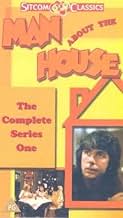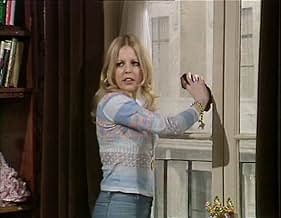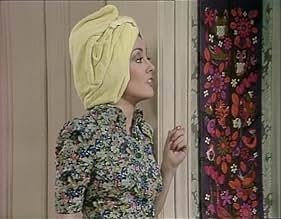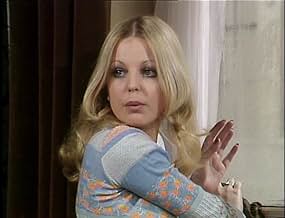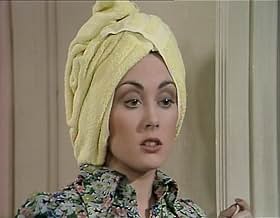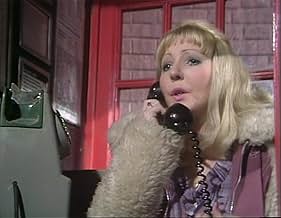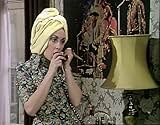VALUTAZIONE IMDb
7,2/10
1718
LA TUA VALUTAZIONE
Sitcom che esplora le prove e le tribolazioni create da un uomo e due donne che condividono un appartamento negli anni '70.Sitcom che esplora le prove e le tribolazioni create da un uomo e due donne che condividono un appartamento negli anni '70.Sitcom che esplora le prove e le tribolazioni create da un uomo e due donne che condividono un appartamento negli anni '70.
- Premi
- 3 vittorie e 4 candidature totali
Sfoglia gli episodi
Recensioni in evidenza
The one thing the Brits know about television is knowing when to stop. This show did more with 39 episodes (& one movie) than Three's Company did with 172 episodes. While it does leave you wanting for more, I'd rather have a few excellent shows than dozens of mediocre or downright horrible ones. Hollywood should take a lesson here.
Richard was a likable bloke and the girls were cute and charming. The Ropers were much funnier than their American counterparts. I liked the fact that they dismissed the whole "Robin is gay" thing almost immediately.
If you've never seen this show, you owe to yourself to check it out.
Richard was a likable bloke and the girls were cute and charming. The Ropers were much funnier than their American counterparts. I liked the fact that they dismissed the whole "Robin is gay" thing almost immediately.
If you've never seen this show, you owe to yourself to check it out.
This programme started to be hard to see in this particular TV market once the American imitation "Three's Company" (1977) started up. "Three's Company" was everything "Man About the House" was not. The British original was funny, sexy, maybe a bit salacious. And it had two cute girls, nice English ones. The grossly inferior "Three's Company" was unfunny, prurient rather than sexy, and basically brain-dead. And no cute English birds, obviously.
"Man About the House" had a proper star, Richard O'Sullivan, who'd just finished his stint as Bingham in "Doctor in the House", a *completely* different role, mind you. Rather than someone like O'Sullivan, "Three's Company" had John Ritter. Years later, it turned out that Ritter could act but that wasn't really apparent in the '70's when he gave the leading one-note performance.
Hack US magazine writers still trot out that tired old cliché about the British being prudish about sex when compared to sophisticated Americans. I've seen a couple of references of that kind in the past month. Well, that might very well have been true in the 1940's, but that was certainly not the case by the '60's, and it's not true today either. If one compares these two series from the 1970's, it's the British one that's mature, while the American copycat seems childish and leering.
I suspect anyone who had ever seen "Man About the House" was left grinding his teeth by "Three's Company" and its long and entirely undeserved run. Surely there's an all-Britcom channel somewhere where this coy ménage à trois can find a happy home again.
"Man About the House" had a proper star, Richard O'Sullivan, who'd just finished his stint as Bingham in "Doctor in the House", a *completely* different role, mind you. Rather than someone like O'Sullivan, "Three's Company" had John Ritter. Years later, it turned out that Ritter could act but that wasn't really apparent in the '70's when he gave the leading one-note performance.
Hack US magazine writers still trot out that tired old cliché about the British being prudish about sex when compared to sophisticated Americans. I've seen a couple of references of that kind in the past month. Well, that might very well have been true in the 1940's, but that was certainly not the case by the '60's, and it's not true today either. If one compares these two series from the 1970's, it's the British one that's mature, while the American copycat seems childish and leering.
I suspect anyone who had ever seen "Man About the House" was left grinding his teeth by "Three's Company" and its long and entirely undeserved run. Surely there's an all-Britcom channel somewhere where this coy ménage à trois can find a happy home again.
10sts-26
While the British produced some hilarious and slick sitcoms in the 1990s - Ab Fab, Men Behaving Badly, One Foot in the Grave, etc. - the 70s were the real golden age.
In the 1970s there were whole new territories to explore, including the sexual revolution, feminism, and the slowly evolving awareness of a need for "sensitivity" that would, twenty years later, become Political Correctness. Attempts to grapple with the confusion of this thoroughly modern world were the subtle and not-so-subtle themes in everything from the skits of Monty Python's Flying Circus to sitcoms like Man About the House. (By the late 70s this "grappling" resulted in more meditative and bitter-sweet sitcoms such as the masterpiece Butterflies.)
Man About the House is a perfect example of the good Britcoms of the time - slightly genteel, cheeky, fresh, ingenuous, sometimes outrageous, with some well made observations on contemporary life. Compare it to a cynical 90s show such as Ab Fab, and it is hard to believe the two were created in the same country.
Man About the House is one of the great Britcoms of the 70s, right up there with Good Neighbors (The Good Life), and About the House's spin off George and Mildred. Its quality is attested to by the fact that - as with Good Neighbors - its creators, writers, and many of its cast have had continued success in British television.
In the 1970s there were whole new territories to explore, including the sexual revolution, feminism, and the slowly evolving awareness of a need for "sensitivity" that would, twenty years later, become Political Correctness. Attempts to grapple with the confusion of this thoroughly modern world were the subtle and not-so-subtle themes in everything from the skits of Monty Python's Flying Circus to sitcoms like Man About the House. (By the late 70s this "grappling" resulted in more meditative and bitter-sweet sitcoms such as the masterpiece Butterflies.)
Man About the House is a perfect example of the good Britcoms of the time - slightly genteel, cheeky, fresh, ingenuous, sometimes outrageous, with some well made observations on contemporary life. Compare it to a cynical 90s show such as Ab Fab, and it is hard to believe the two were created in the same country.
Man About the House is one of the great Britcoms of the 70s, right up there with Good Neighbors (The Good Life), and About the House's spin off George and Mildred. Its quality is attested to by the fact that - as with Good Neighbors - its creators, writers, and many of its cast have had continued success in British television.
Having lived in both the UK and the US, and watched both the ORIGINAL, "Man About The House", and the US COPY, "Three's Company", I've enjoyed both of them, even now, in 2006.
I've just been watching M.A.T.H. on Paramount Comedy, and much as I liked Three's Company, I'm finding I laugh out loud more often, at the UK show. I loved the American re-make too, but I guess my British upbringing means I identify with the British humour more.
It's just one of many UK sitcoms from the 1970's, that US television bought the rights and scripts of, and remade with an American flavour. Most of them became very popular in the US, with few people realising they were copies of original British ideas/scripts. Others I can think of:
"The Ropers" = "George & Mildred" "Sandford & Son" = "Steptoe & Son" "All In The Family" = "Till Death Do Us Part" "Reggie" = "The Rise & Fall Of Reginal Perrin"
All were good re-makes.
Conversely, on the few occasions the British have re-made American comedies, it hasn't worked as well. I'm thinking of UK remakes of "Golden Girls" and "Married With Children" - both British re-makes sucked, big time. In the case of the Married With Children re-make, I think it failed because the whole premise of the show was that it mocked clichéd "US cute family" comedies (it was known as the Anti-Cosby Show by the writers), and such humour didn't translate to a British show about a British family.
And now it's the 21st Century, and what do we see on NBC? An American re-make of the Golden Globe-winning British comedy, The Office.
Nothing changes.
I've just been watching M.A.T.H. on Paramount Comedy, and much as I liked Three's Company, I'm finding I laugh out loud more often, at the UK show. I loved the American re-make too, but I guess my British upbringing means I identify with the British humour more.
It's just one of many UK sitcoms from the 1970's, that US television bought the rights and scripts of, and remade with an American flavour. Most of them became very popular in the US, with few people realising they were copies of original British ideas/scripts. Others I can think of:
"The Ropers" = "George & Mildred" "Sandford & Son" = "Steptoe & Son" "All In The Family" = "Till Death Do Us Part" "Reggie" = "The Rise & Fall Of Reginal Perrin"
All were good re-makes.
Conversely, on the few occasions the British have re-made American comedies, it hasn't worked as well. I'm thinking of UK remakes of "Golden Girls" and "Married With Children" - both British re-makes sucked, big time. In the case of the Married With Children re-make, I think it failed because the whole premise of the show was that it mocked clichéd "US cute family" comedies (it was known as the Anti-Cosby Show by the writers), and such humour didn't translate to a British show about a British family.
And now it's the 21st Century, and what do we see on NBC? An American re-make of the Golden Globe-winning British comedy, The Office.
Nothing changes.
I have such fond memories of watching this show. I would love to see it again. Yes, it was copied by Three's Company but the two shows diverged quite a bit after awhile. What I liked best about it was the sexual chemistry between Robin Tripp and Chrissy (the smart one). They were always bantering and teasing and arguing but you knew underneath there was something there. I was always waiting for the dumb blonde (Jo) to get out of the way so they could get more romantic. I wish I could remember how the series ended. I think they got together but maybe it was just wishful thinking on my part. I do remember the series Robin's Nest and it was kinda cute but there was no chemistry without Chrissy. In the American series, Chrissy was the dumb blonde, Janet the smart one but neither one had any real romantic relationship with John Ritter's character. I think people here have been too harsh about Ritter. He was all slapstick its true, but that was an art in itself! Different kind of humour. I prefer the British series as it was more subtle and clever, but I also enjoyed the American version. Although it really lasted at least two years too long!!
Lo sapevi?
- QuizWriters Brian Cooke and Johnnie Mortimer were inspired to create "Man About The House" after noticing increasing numbers of advertisements in the London press for flatmates of either gender - until the early 1970s, it was usual for flatsharing households to be all male or all female.
- Curiosità sui creditiThe closing credits in later series show each credit caption against a still image featuring two 'female' objects and one corresponding 'male' object (eg drinks or item of clothing). One still image used features two cooking utensils as the 'female' items and a spanner as the 'male' item. This is ironic given that in the show Robin is a cookery student while Chrissy and Jo are self-confessed terrible cooks.
- ConnessioniFeatured in All Star Comedy Carnival (1973)
- Colonne sonoreUp to Date
(uncredited)
Composed by Johnny Hawksworth
Performed by The Hawksworth Big Band
[series theme tune]
I più visti
Accedi per valutare e creare un elenco di titoli salvati per ottenere consigli personalizzati
- How many seasons does Man About the House have?Powered by Alexa
Dettagli
- Data di uscita
- Paese di origine
- Lingua
- Celebre anche come
- Man About the House
- Luoghi delle riprese
- Alma Square, St John's Wood, Londra, Inghilterra, Regno Unito(exterior: George and Mildred's house where in the flat is rented.)
- Azienda produttrice
- Vedi altri crediti dell’azienda su IMDbPro
Contribuisci a questa pagina
Suggerisci una modifica o aggiungi i contenuti mancanti


